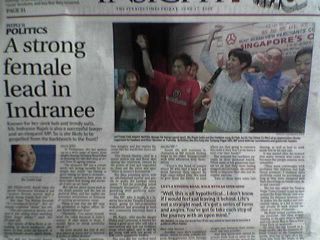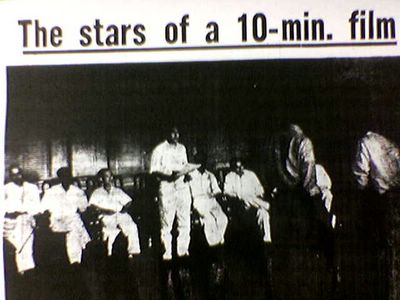"The Government will pull back from being all things to all citizens. This is so not only in minor municipal issues, but in some far-reaching ones too. For example on questions of public morality and decency, we are increasingly guided by the consensus of views in the community. We will give weight to minority views, but we cannot move only when the last man or the most conservative person is willing to move. Otherwise we would be restricting the options open to many others in our society, and stifling the diversity that we need to be an open, cosmopolitan people. We would eventually atrophy."
- PM Lee Hsien Loong, 6 Jan 2004"To say ‘no’ after worldwide publicity for a year, Singapore will be sending out the wrong signal, that we want to stay put, to remain the same old Singapore, a neat and tidy place with no chewing gum, no smoking in air conditioned places, no this, no that, - not a fun place. The old model on which I worked was to create a first world city in a third world region - clean, green, efficient, a pleasant, healthy and wholesome society, safe and secure for everyone. These virtues are no longer sufficient. Now we have also to be an economically vibrant and an exciting city to visit, with top class symphony orchestras, concerts, drama, plays, artists and singers and popular entertainment. These are the lifestyles international professionals and executives seek. We want the companies who manage these entertainment troupes to include Singapore on their tour of cities around the world."
- MM Lee Kuan Yew on integrated resorts in Singapore, Parliament, 19 Apr 2005 Dear all,
Just an update on developments regarding the police investigations on Singapore Rebel.
Well, there is none. The police has not called me since the last interview on May 16.
And while I entertain in my own mind some possible reasons for the delay, made even more perplexing since they had hurried me for the first interview, I have been more intrigued lately by a spate of events which has led me to believe that Singapore is now caught in a moral dilemma.
We want to relax, to loosen up, to be cosmopolitan, to build casinos,
to host topless revues, to be
the London of the east. Yet, at the same time, we want to be seen as a country that upholds high moral values. As such, we continue to ban gay concerts and parties, risque pictues in fashion magazines,
'biased' political films and anything which is "
contrary to public interest."What constitutes
"public interest" is itself a contention which can be discussed some other time.
But what must strike any visitor to this island is how Singapore balances its clean, wholesome image with a seemingly new missionary zeal to embrace
pop culture,
mavericks, bohemians,
rock n'roll and
anything that is "with it."It makes for a pretty schizophrenic situation. Take these examples.
- We
ban a drawing of a sex orgy in Benetton's Colors magazine but
allow our bloggers to pose nude on the internet, and our own celebrities to go braless on the covers of FHM, Maxim, etc.
- We ban nude pictures and sex publications but we have one of
the highest percentage of internet users who surf the web purely for pornography.- We ban
Christian pop duo Jason and DeMarco for
promoting a gay lifestyle but proudly hosted
Elton John and
Boy George, two of the world's biggest gay icons.
- We
ban foreigners from 'meddling' in Singapore politics but
allow foreigners to run our casinos,
helm our GLCs,
make recommendations to our wages and
compete for jobs here.- We
ban Singaporeans from staging protests but
allow foreigners to stage theirs at next year's IMF/World Bank meeting.- We
ban gay parties but allows gay spas to sprout all over town. (Did I hear anyone say there are no sexual activities in these spas?)
- We
ban 'unnatural' (or gay) sex but
allow gays to work in the civil service.- We
ban crusading journalism but
allow our journalists to petition the Chinese government for a fair trial of detained correspondent Ching Cheong. For the record,
six people were detained in Singapore under the ISA in 1997/98 on spying charges. Their names were never disclosed.
- We
ban foreigners from criticising our system but
cite foreigners when
they praise our system.- We ban adult videos but allow the documentary
Inside Deep Throat to be shown in our cinemas. In other words, we are not allowed to watch Deep Throat but we are allowed to watch a documentary made about it.
- We
heavily censored local filmmaker Royston's Tan's teen gang film '15' but allowed a much more violent
Young And Dangerous (HK) and
City of God (Brazil) to be shown with minimal cuts.
But all things considered, Singapore has indeed opened up in some ways. For example, we can now shop from ten shopping malls instead of one; we can now afford to travel to places further than Malaysia for our holidays; our students have a lot more choices in education; we have invented more ways to spend and invest our money.
Culturally, too, there appears to be some loosening up - there are more nudity on cinema screens, more bar-top dancing in the pubs, more cacophony of advertising campaigns on the streets.
Still, when the mantra of 'Singapore is opening up' is repeated too often, we sometimes confuse consumer freedom with the
civil rights to freedom of speech, assembly, association and media. But first, what exactly constitutes an 'open society?' And here, no one described it better than Singapore's founding father Lee Kuan Yew.
_____________________________________________________________________________
"Let us get down to fundamentals. Is this an open, or is this a closed society? Is it a society where men can preach ideas - novel, unorthodox, heresies, to established churches and established governments - where there is a constant contest for men's hearts and minds on the basis of what is right, of what is just, of what is in the national interests, or is it a closed society where the mass media - the newspapers, the journals, publications, TV, radio - either bound by sound or by sight, or both sound and sight, men's minds are fed with a constant drone of sycophantic support for a particular orthodox political philosophy? That is the first question we asked ourselves. I would like to see minds stimulated and debate provoked, and truth refined and crystallized out of the conflict of different evidence and views. I, therefore, welcome every and any opportunity of a chance to agree, or to dissent, in order that out of thesis comes synthesis - thesis, anti-major premise, anti-premise, synthesis, so we progress... I welcome every opportunity to meet members of the opposition, and so do members of my party, over the radio, over the television, university forums, public rallies. We never run away from the open encounter. If your ideas, your views cannot stand the challenge of criticism then they are too fragile and not sturdy enough to last. I am talking of the principle of the open society, the open debate, ideas, not intimidation, persuasion not coercion... Sir, the basic fundamentals we asked ourselves...is whether the duties of the Minister of Information and Broadcasting are to produce closed minds or open minds, because these instruments - the mass media, the TV, the radio - can produce either the open minds receptive to ideas and ideals, a democratic system of life, or closed and limited. But I know that the open debate is a painful process for closed minds...But let me make this point: that 5 million adult minds in Malaysia cannot be closed - definitely not in the lifetime of the people in authority. It is not possible because whatever the faults of the colonial system, and there are many...they generated the open mind, the inquiring mind."
- Lee Kuan Yew Dec 18, 1964 Malaysian Parliamentary Debates
______________________________________________________________________________
Yes, Singapore has made incremental changes in opening up society. But sometimes we take one step forward only to take two steps back.
Take these examples.
- 50 years ago,
Singapore was home to a thriving movie industry. Back then, the Shaw Brothers and Cathay Keris studios were churning out blockbusters for audiences in Asia. In the last ten years, we made only an average of three to four local feature films a year, as the rest of Asia have surged ahead in movie-making technology, creativity and marketing.
- 40 years ago,
Singapore had a vibrant pop music scene. Bands like The Quests were hitting the top of Asian charts. Today, the English-language pop and rock music scene is barely breathing, struggling even to get onto the airwaves of their country's own radio stations.
- 50 years ago, Singapore had a dozen or so newspapers that were mostly independent. Views were freely expressed from the Left, from the Right, from centre, to a largely illiterate population. Today, even with a largely educated citizenry,
our press freedom is ranked 147th - the
most locked-down domestic media amongst developed nations.
- 20 years ago, Singaporeans had more chances to exercise their votes simply beacuse
we had more opposition candidates. The
last GE2001 saw the worse participation by the opposition since the
Barisan boycott of 1968. Two or three elections from now, Singaporeans' right of universal suffrage will be forfeited, as the opposition may be rendered extinct.
- 17 years ago,
the NTUC held a mass demonstration against U.S. interference in Singapore politics. Today,
the government bans all forms of
protests and demonstrations.- 10 to 15 years ago, we could watch live proceedings of parliamentary debates on television. There were also televised select committee hearings on the
Law Society, Elected President, Shared Values and so on. Today, we get only edited snippets of parliamentary debates on the nightly news bulletins. Open political debates on TV has become a thing of the past.
- For 4 years running, the gays, lesbians and party-goers of Asia could congregate in Sentosa for the annual Nation party. Just this week,
the police slapped a ban on it.- 10 years ago, there were no laws banning the making of 'biased' political films. Today, I am under police investigation.



